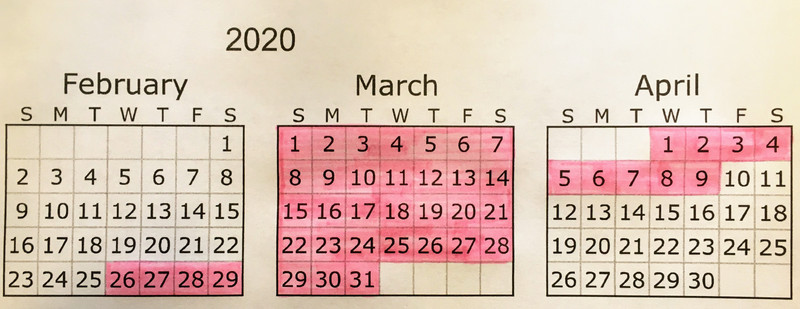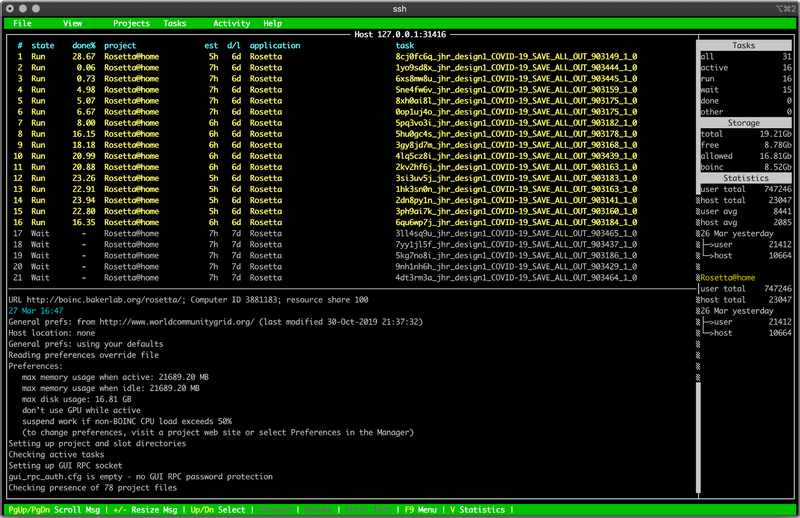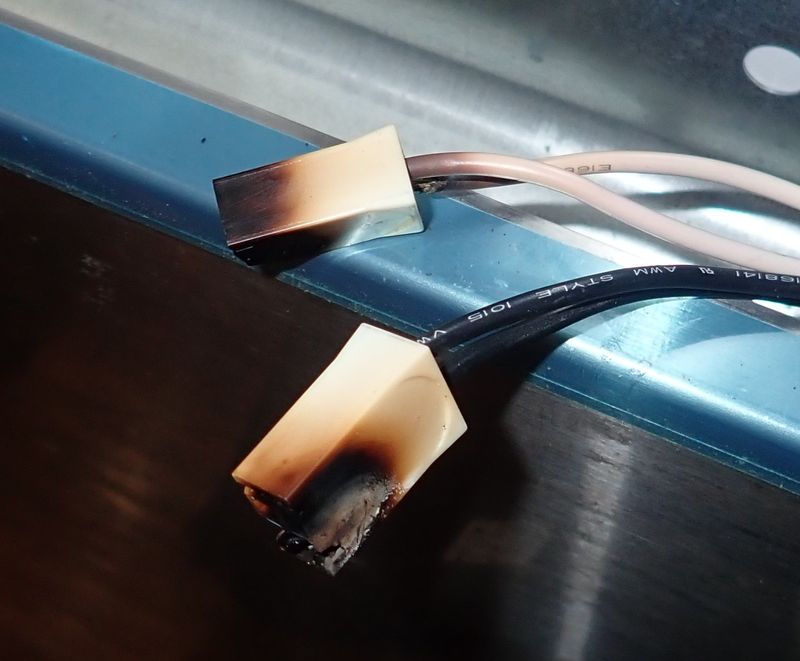Lent, 2020. Wednesday, Feb 26, 2020 to Sunday, April 12, 2020.
It’s 11 days from now.
And it’s a perfect time to cut back on your internet and technology use. A time of resetting. A time of re-evaluating your relationship with technology. And, importantly for 2020, a time of getting used to less internet use and distraction before the true core of Election Outrage Season 2020 begins. Gets worse. Continues. Whatever it’s going to do.
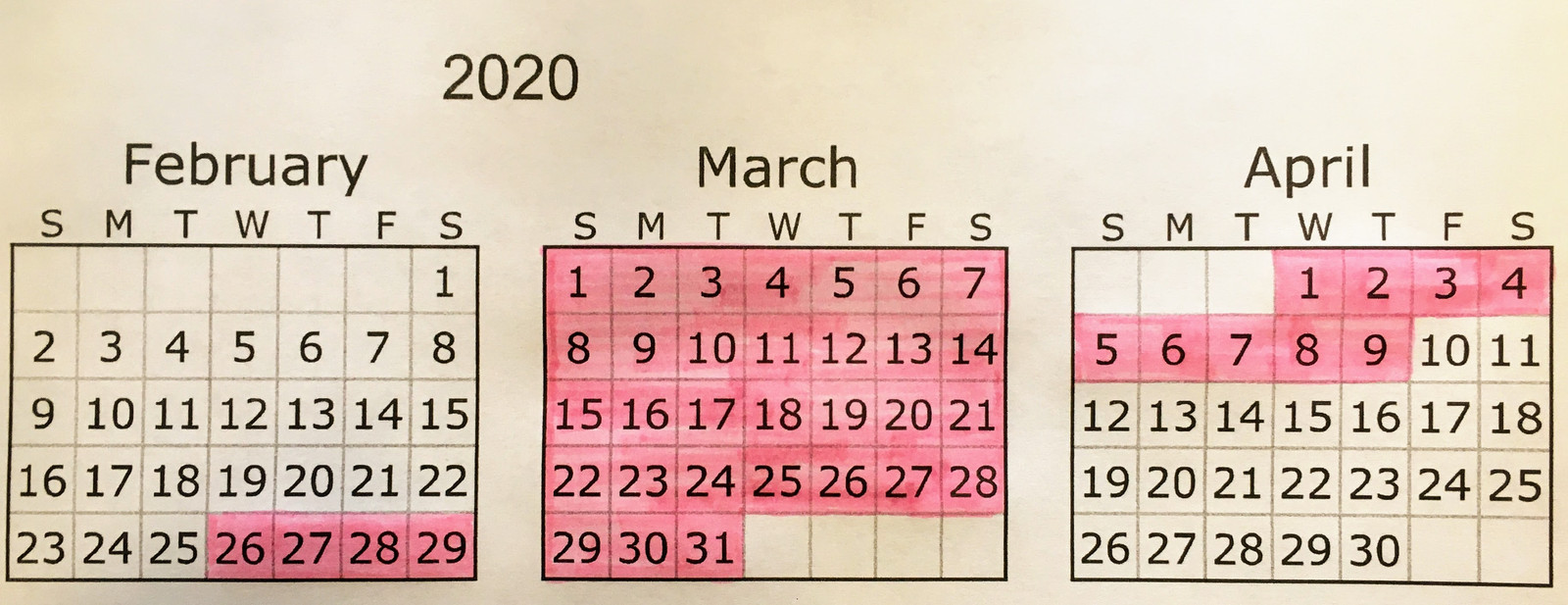
Why? Because the distance allows you the time and space to evaluate what’s of value on the internet, and what’s just a shiny distraction that really, really wants to shove ads in front of your eyeballs and will do anything they can, regardless of the impact on you, to get you to view ads.
Join me?
You’re Crazy, Right? Low Tech? Low Distraction?
Yup. I’m crazy. I’ve long since accepted this and it doesn’t bother me a bit anymore.
I’m proposing deliberately reducing your technology use and level, for over a month, as an experiment/reset/slowing/etc.
Humor me, though. Read through the post before you decide I’m a loon (even though I might be). I rarely post about anything I haven’t tried/will be trying, and the results of this experiment over the last few years, to me, have been overwhelmingly positive.
Just because something is an older way of accomplishing a task doesn’t mean it’s worse. I’m writing this post, at the moment, on a decade-old netbook (Clank), in greyscale/redshifted, with room light from a kerosene lantern. And sea shanties as music, via Spotify and a modern Windows 10 NUC with some nice speakers. Picking and choosing technology can get one into places that are regarded as pretty weird - but more on that later.
Technology, Addiction, and the Modern Tech Industry
I’ve written before about technology and addiction , and that post covers a lot of my thinking on the topic - go read it, if you haven’t. Nothing meaningful has changed since I wrote it a year and a half ago.
Our collective approach to modern technology has a certain bias. We assume that any new technological gizmo is, self evidently, better - because it’s new! We don’t generally consider the costs - or even acknowledge that there are costs of technology. They may not be monetary (though they’re getting there - have you priced a new smartphone lately?), but they may be in our ability to pay attention for more than a few dozen seconds without our minds wandering. Or, in our relationships with other humans. “Social media” is anything but social, and it generally tends actively harmful to the local relationships that matter. I’m aware I’m “old” now (closing in on 40), but even talking to people still in middle school and high school, the absurdity of the social media ecosystem is well known. “Delete Your Apps” is a thing, and a good one!
As much as it pains me to say it, the modern tech industry has gotten themselves into a rather silly place. Many of the large companies use “user generated content,” organized into feeds by algorithm, as a way to deliver the proper dopamine hit, at the right intervals, to keep you “engaged with the platform” - or, in other words, addicted. Why? To maximize the time they can shove personally predicted ads into your face and therefore make an insane amount of money. Our Shiny New Future!
The problem comes when we accept these things as the new normal and then eagerly jump in. Remember, smartphones are barely over a decade old. There are those of us who remember the time before smartphones (and before the Internet - and, yes, I’ll capitalize it). The faint recollections of this history show that the shiny new future we’ve invented may not be so shiny as we like to think. But, if we’re soaking in it, we don’t have a chance to really sit back and evaluate things. My suggestion in this post is to create the time and space to actually evaluate our modern tech ecosystem - and, I hope, you’ll come to some conclusions that aren’t the default option!
If you doubt this, I’ve got a list of interesting books to read (later in this post) that back my argument. Read them this Lent!
Previous Experiments and Results
This isn’t something new to me. Starting in 2018, I began experimenting with a low connectivity Lent. I’m in a part of the country where “I’m doing this weird thing for Lent” is still considered a reasonable excuse, and, well, it’s a lower tech part of the country anyway. Quite nice, really.
I have been exceedingly happy with these experiments. They serve as a time of resetting from the defaults of internet use. There was a time, not that long ago, when many things weren’t on the internet. I remember them - and I can compare the current time, when basically everything that matters is internet-connected, to what we had. It’s not always an improvement.
So don’t dismiss this as a “Oh, yes, you should totally try this thing I’ve heard about” sort of post. I’ve done it, I intend to do it again (I’ll be doing it this Lent), and I greatly enjoy the time. At this point, I look forward to it!
I’m Bored: Internet!
The past 10 years have brought a radical change in how we interact with the internet - mostly because of smartphones. In the early 2000s, there were plenty of things on the internet that could distract you if you didn’t want to do schoolwork, but you had to be at a desktop. It wasn’t in our pockets - and we didn’t even have laptops to surf on the toilet. Desktops could tend a little bit insane, as mine was, but I couldn’t carry it with me. Or, really, anywhere.
No, really. My desktop, for a while, was a 2’ x 2’ x 3’ plywood box, with a dual Pentium III system and an awful lot of hard drives in it.

But with smartphones and increasing cell connectivity, the internet has seeped in to fill every single tiny gap in our lives. Got a few seconds to spare waiting in line at the store? Check… whatever. I used to check AdSense earnings for this blog. “Oooh, up a few pennies today!” Yay? Maybe my eBay purchases have moved! Nope, same tracking info from an hour ago. Facebook, Twitter, Instagram, SnapChat, they’re all now lined up, vying for your attention in those seconds without anything going on.
Quite a bit of research has shown that periods with nothing stimulating going on (“Boredom”) are when the brain does a lot of background processing - the sort of thing you want to encourage. It’s also a great time to do that horrible thing called being social and talking to people in person. Even if you don’t know them!
And that’s before one calculates the monetary costs of this always-on connectivity. I used to carry around an unlimited data plan for my phone (because, why worry about data limits when I could just have all the data!), and I figure I’ve easily spent over $10k on cell connectivity in the last decade (before I realized this was stupid and rolled it back substantially). Some of it has been worthwhile. A lot of it? Not so much.
It’s Not That They’re Evil, It’s… Erm. Well. They… hm.
Let me walk you through the business model of depressingly many modern internet companies.
They get “users” of their platform to generate content that they then “feed” to other people using the platform.
By using machine learning, algorithms, and buzzwords, they optimize this “bottomless feed” for maximum “engagement” (addictive behavior). With billions and billions of datapoints, this is pretty straightforward - you can trivially A/B test users, and since you log literally everything about how they use the platform, it’s easy to see which has more “engagement.”
To encourage posting more content for them to slice and dice and feed, they provide feedback mechanisms that drive humans up the wall. Metrics. Intermittent rewards. Reasons to check back in. Was this post liked more than the other one? Why? I thought it was awesome!
If you let them (which, of course, is the default), they’ll ping you at all hours of the day and night with notifications. Hey! Check in! Someone one of your friends from highschool briefly dated posted something! Check us out! Scroll the feed!
And all of this - ALL of it! exists to serve the best part. They then use this so they can… *evil cackle* put customized ads in your feed and sell that advertising space for maximum dollars! Muahaha!!!!!
It sounds pretty absurd. Think through it. It’s literally a description of quite a few exceedingly wealthy tech companies.
And if they’re not doing it through social media, they want to learn everything they can about you through other means to “personalize” your feed - for engagement, or item sales, or… whatever they can work out, really. As long as you’re either giving them money or attention in increasing amounts, all is good in their world.
You? Your attention, concerns, mental health? Well. Whatever. You’re just a pair of eyeballs to monetize. Two of millions, though preferably two of billions.
Recently, there’s been a good bit of talk about “Surveillance Capitalism” and “Behavioral Surplus” - that’s the resource that modern tech companies work with. There are consequences to this - but if it’s just the new normal, the technological air we breathe, it’s hard to notice.
Resetting from the Default
And this is our modern default. Spending a lot of money on devices, then a lot of money on connectivity plans, so we can be connected anywhere we go as a willing set of eyeballs to whoever can send us the most “engaging” content on their platform (that other users created - so it’s free to them in the first place).
It’s absurd - but it’s what a lot of us have come to know. The solution is a proper detox - a disconnecting from this ever-speeding-up treadmill of madness. This creates the mental space to decide if all of this is actually what we want from our life and attention, or if it’s just the rut we’ve been guided into (by the people selling ads). It’s an easy rut, but is spending all your time on a phone or computer really the mark of a life well lived? Are you really going to hit the end of your life wishing you’d just spent more time staring at a bunch of little colored dots packed into a dense rectangle?
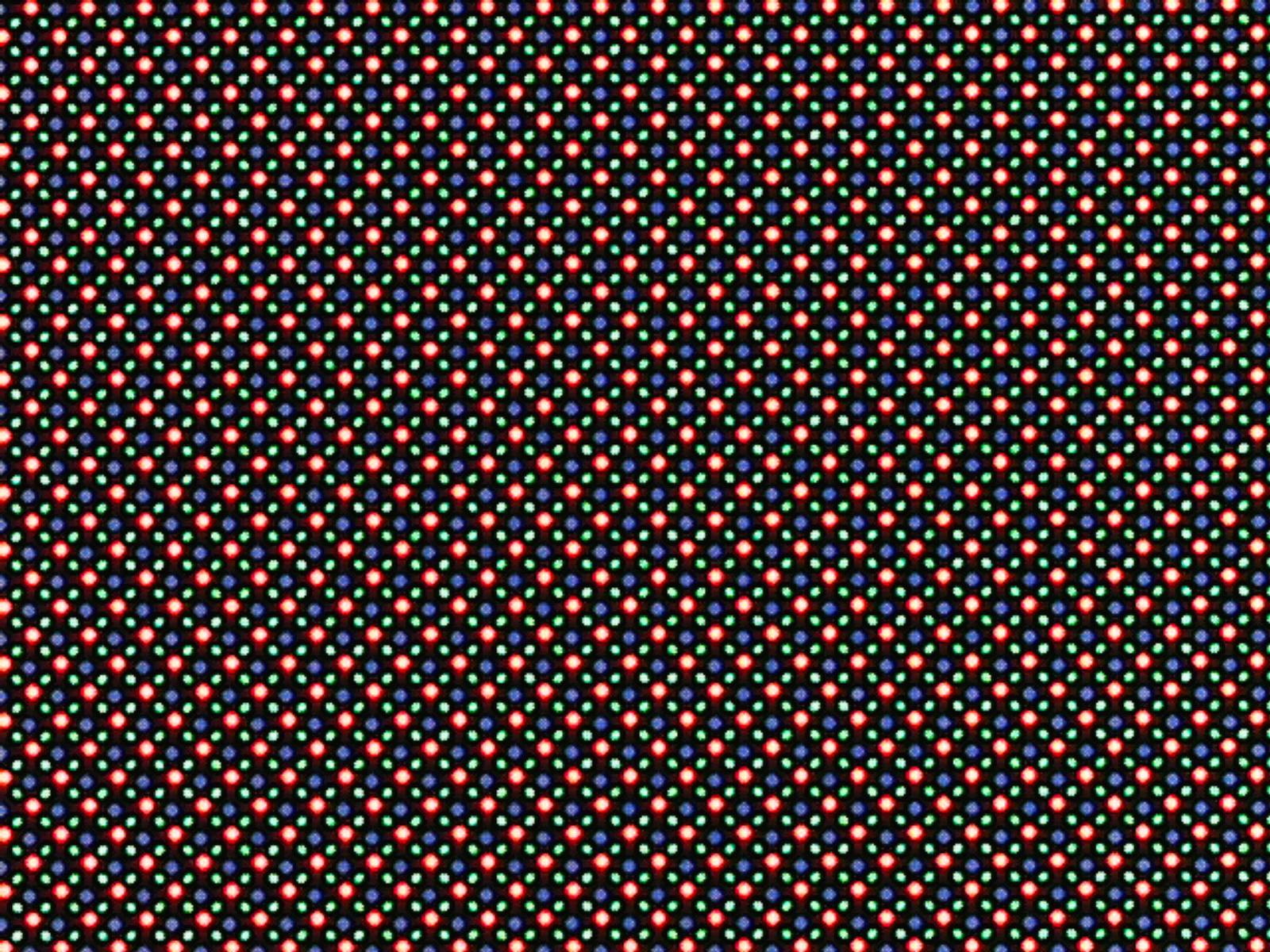
In my experience, the right solution to this situation is to just turn it all off. Disconnect from the non-essential for a bit over a month (the exact time doesn’t matter, Lent happens to be a really convenient timeframe). Then, at the end, step back and decide what you want to add back into your life. Maybe some of it is valuable. Maybe some isn’t. You’ll have the ability to make those decisions as you start from a perspective that’s been reset.
Yes: You will miss out.
There will be things you’ll miss. Even if you try to catch up, after a suitably long period, you can’t. It’s impossible - there’s so much back content that even if you try, it won’t work. And that’s the point of the longer period! You will end up missing out, and it’s OK.
I’ve taken this approach to news over the past year or two. What I’ve learned is that it’s basically impossible to miss out on anything sufficiently important. People will ask you about it (and happily share if you look confused). The radio will mention it. Something in your email will reference it. It seeps in. No matter how hard you try to live under a rock, I promise you - you’ll end up knowing the important things.
But you might not know them exactly as they happen. That’s fine too! My goal with news at this point can be described as “eventual consistency with a representative sample.” If you’re honest, this is all anyone can get - being eventually aware of some cross section of events. I’m just happy with a far, far longer “eventual” window than many people, for a lower cross section of the news. I try to focus on things that are actually relevant to my life, and, preferably, things that I can have an impact on. The state of solar in Idaho? Yeah, I’ll pay attention to that kind of stuff.
To borrow a somewhat recent example, think through the Notre Dame fire last April. My best efforts to avoid the news didn’t lead to not finding out about this (I think via a group chat I’m in). A lot of the internet seemed to be paying attention to the details of it as things happened, and I’ll admit I was sucked in a bit. But, was the instant update stream of any value? No. I don’t live in France. I’m not a member of the Paris fire departments in that area. There was, quite literally, nothing I could do about it. And at that point, does it matter if I find out about an event as it’s happening or a day later? Or a week later? No. It did, however, distract me from what I was supposed to be doing.
I’ve known a number of people over the years who value their up-to-the-minute knowledge of events. At this point in time, it’s usually referred to as “Being Informed” - with the evident comparison to the horrible state of “not being informed.” I prefer using the term “News Junkie,” which has a few more negative connotations. They end up roughly the same, though. If you’re one of those people who values being up to the minute, I have a simple question: Why?
What is the actual value, to you, of being up to the minute on things that, as a solid approximation, you can’t influence? You can’t change?
Then, the next, harder question: What are the costs in your life - personally, professionally, sanity-wise, mental clutter, of this habit? We only have a limited amount of time and attention - is keeping up with national and international events if you’re not a news writer really the best use of it? You’ll find out about a lot of it eventually.
But consider where you direct your attention. Is it going to places that you want, or is it going to places that, somehow, convince you they’re important, put ads in your front of you, to enrich themselves, while ruining your ability to focus on that which is important in your life?
Therefore: Low Distraction Lent!
If you’re still reading at this point, I can reasonably assume you’re at least slightly interested - otherwise you probably would have closed the tab and moved on a long while ago. If you’d done that, you would have missed out on this super cute ferret!

What are some ways to begin preparing for this period? What are some of the gotchas? How do you fill all that free time? These are all important things to think through, because if you just randomly decide to stop using tech as much, it rarely works well. There’s a ramping in period that’s vital for success.
And there’s a lot I’m going to miss here - at this point, I’m not really plugged into social media. I’ve evaluated it and found it lacking in signal to noise ratio for my needs, so I can’t offer much in the way of advice with the specific modern systems. But over the past few years, I’ve been reducing my internet use, and it’s been very, very welcome.
The biggest thing you’ll have to figure out is how to spend your time - because, like fasting from food, if you remove the bulk of the time spent on devices, there’s a huge time gap that opens up. One of the keys is to find other things to fill that time. Creative pursuits are good, I tend to think reading books is good, board games are excellent, and personal time with other people, face to face, is absolutely excellent. Time spent harassing ferrets is also excellent.
You’ll want to set your own guidelines based on your goals and situation. For me, I still generally consider the use of technology for direct, person to person communication, as reasonable. I’ll even extend that out to some group chats with people I’ve known for years, though I’m likely laggier than normal. Anything that’s endless-scrolling and algorithmically generated, though? No. And that, sadly, includes a lot of news websites these days.
Video or audio entertainment is really up to you - if you think it’s a problem, take a break from it. If it’s not a particular issue, use it responsibly. If you try to have a low distraction Lent and find yourself bingewatching half a dozen series you don’t care about on Netflix, maybe that’s not the best use of time…
The time leading up to Lent is also a great time to experiment with some changes to your devices to make them less appealing. I’ve got a few suggestions, but I’m sure there are options I’ve not considered as well!
Greyscale Your Devices
You see “greyscale your devices” tips every now and then, at least in the corners of the internet I frequent - but rarely do they seem to talk about the long term results of how it works.
Surprisingly, most modern OSes include the ability to greyscale everything - with built in tools! Linux is actually the hardest OS to accomplish this on, because it tends to be dependent on the window manager. I’ve not found a general solution that works for everything on Linux, interestingly enough. I may work on that.
But Windows, OS X, iOS, and Android all include, as part of the OS(!), ways to turn your OS greyscale (and then, ideally, redshift it in the evening - you want the greyscale to apply before the redshift).
It’s initially shocking to put devices into a greyscale mode - but after a while, it becomes shocking to drop back to colors. If you get used to a modern phone in greyscale, and then switch back, it feels sickeningly sweet with colors (for lack of any better terms to describe the effect). It’s… all saturated, and clashing, and… ew. Turn it back off!
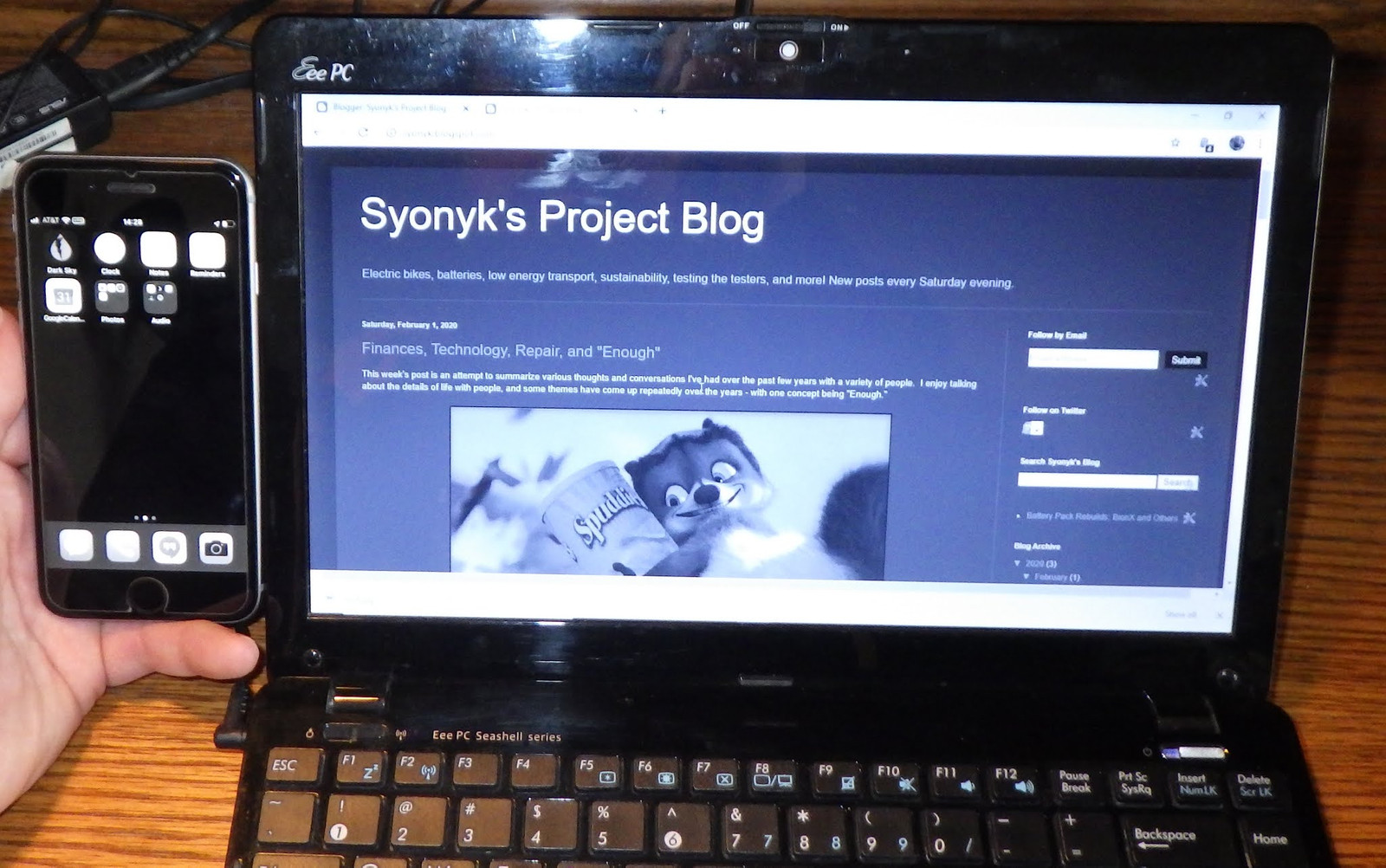
It also makes looking away from the computer a bit of a visual treat. The world has colors and it pops, unlike the screen! I happen to think this effect is quite healthy and the way things should be, personally.
But try it. At least for Lent. Give up colors on your computers unless you really, really need them.
Turn Your Devices Off
I don’t mean, “asleep.” I mean, actually off. Powered down. Takes a few seconds to boot, then scrambles to catch up on everything. It’s quite surprising how many devices these days really get upset if they’re not always on (or frequently on). They boot, then… spent the next few minutes scrambling to catch up. If it’s a slow device to start with, and you’re on a slow connection, it’s quite painful to use for a while.

And this is the point! It adds friction. You can’t just jump on a device and get sucked in - it requires effort and some planning. Perfect!
One thing I’ve found while experimenting is that I tend to think of something that I need to do online (purchase something, check something, etc), then immediately drop what I’m doing and go handle it. And, hey, check email. And.. etc. The solution I’ve found is to keep a list (on paper) of things that you need to do online, then handle them once a day or so in a batch. Things to buy, things to check, whatever. Just write them down, then process them all at once. This also gives a checklist to go down, and helps avoid the distraction of “I’m in front of a computer, not really doing anything… ooh, reddit!”
Use a Slow Computer
Remember two decades ago, when a couple hundred MHz was blindingly fast, 256MB of RAM was a vast amount, and hard drives were in tens of gigabytes?
You can do a lot on remarkably minimal computer, if you’re patient. This is something I’ve learned with my little ARM desktop experiments. I can do almost anything I want on them - just not everything all at once. With very few exceptions, a desktop-configured Raspberry Pi 4 can do anything you’d want to do. A Raspberry Pi 3B+ can do an awful lot of it as well. Or refurbish an old laptop and use that.
In addition to saving money from not having to buy expensive new hardware when cheap new hardware or cheap older hardware works, slower hardware adds just enough friction that it’s worth considering if you actually want to do something before setting off on it. Clank (the ancient netbook I’m doing most of this post on) will do almost everything I want to do, though any gaming at this point is basically impossible (conveniently, I don’t really want to game much). But it sure won’t do a few of those thing at once. It’s a great little portable, single tasking laptop with a couple good hours of battery life.
For Lent, try adding friction to the process. Smooth, seamless internet access is really quite the drug these days, and it’s best to make it harder if you want to spend less time on it.
Block Sites: Locally, or at your router
The world won’t end if you can’t access Reddit for a month. Pick the sites that distract you, and make them harder to access. Block them on your machine, or at your router. Yes, there are workarounds if you absolutely need to check them, but again - you’re adding friction. It requires work to access them, instead of a few quick keystrokes in the browser.
If you’re on a Mac, the Self Control App is quite nice. I’m sure similar things exist on Windows and Linux, but I mostly just block stuff at my router and call it good. Adjust the block length to 40 days and be done.
You’ll be amazed by how much an error screen reduces your temptation to go check a site!
No, Don’t Be Stupid.
And at no point here am I suggesting you be stupid about this. If you need internet access for work, use it. Just keep the random surfing down. Check your email. A few minutes in the evening is often plenty for personal email checking. If you need to buy something online, well… go do that.
Just be mindful of your use. If you find yourself on Reddit or Facebook, wondering where the last few hours have gone, well… you’ve missed the point.
The modern internet tries to treat everything as important and time critical - but it’s not. Figure out the difference, and push the non-time-critical stuff to a lump of time all at once.
Books To Read
I promised a couple books on the topic - so, some suggestions if you’re looking for some light (or heavy) reading for the month!
Irresistible (Adam Alter): If the history of the last decade or so of phones, addiction, social media, etc, is of interest, this is a good starting point. It covers a lot of the history of how we got here.
Surveillance Capitalism (Shoshana Zuboff): This is a deep dive into the nature of how and why companies are able to make fortunes extracting the “surplus.” If you’ve ever wondered why it seems like every device is just an excuse to extract as much data as possible from your environment, and wondered what the use is? Read this.
The Shallows (Nicholas Carr): This particularly horrifying read from 2010 covers research on the first decade or two of the internet - how our brains are plastic even into adulthood, and are essentially rewired to be good at that which we ask them to do. The internet, even before smartphones, was effectively rewiring brains to be “good at the internet” - and, by contrast, bad at “not the internet.” If you’re older, used to read a ton, and just can’t get through books anymore, this book (yes, I know…) explains why - and how to counter it. Unfortunately, about the time this book came out, smartphones took that which was researched, turbocharged it, added boosters (and struts), and then pushed the limits as hard as they could. Highly suggested read!
Deep Work (Cal Newport): Want to get good at the sort of stuff that most people aren’t good at doing, be hyper-efficient with your time, and have the space to learn the sort of deep skills that turn out to pay well and offer a lot of flexibility in life? Shut your phone down and read this.
A Philosophy of Technology?
Finally, if you’re still with me: Do you have a philosophy of technology? Or, going more corporate, a “Technology Mission Statement”?
Thinking through material for this post, as well as two weeks ago (on “enough”), I realized that a lot of what I’m trying to hammer down is my personal philosophy of technology - or a mission statement. If there’s some new device/service/app/etc, what do I have that I can measure it against and decide if it’s worth using? How can I evaluate it and see if it’s worth continuing to use? How might I decide between a new computer and a refurbished computer for my needs? Are Intel chips trustworthy enough to be in any new computers I deal with?
A depressingly common default, which I’ve certainly worked with in the past, can be summed up as “It looks neat and I can afford it.” Buy the newest and shiniest thing you can afford, then figure out how to use it and what it can do! “Do I need this?” and “Is this the best way to do what I want to do?” doesn’t factor in at all. Last week I talked about “enough,” but I realized I didn’t have a good way to decide if some bit of technology really was “enough.”
So I’m working through this, and will probably do quite a bit of thinking on it over Lent. I’m not entirely sure where it will go, but… have you thought through this? If so, I’d love to hear your thoughts (either in a comment, or ping me via the sidebar if you want to chat about it).
See You in April!
In past years, I’ve sometimes posted during my annual break, and this year, I’m not. I’m going to disconnect about as hard as I can and still do that which I’m responsible for - so, I’ll not be posting during Lent. I’ll still moderate comments every now and then, and I can still be reached via the sidebar, but I’ll catch back up after Lent!
Comments
Comments are handled on my Discourse forum - you'll need to create an account there to post comments.If you've found this post useful, insightful, or informative, why not support me on Ko-fi? And if you'd like to be notified of new posts (I post every two weeks), you can follow my blog via email! Of course, if you like RSS, I support that too.
